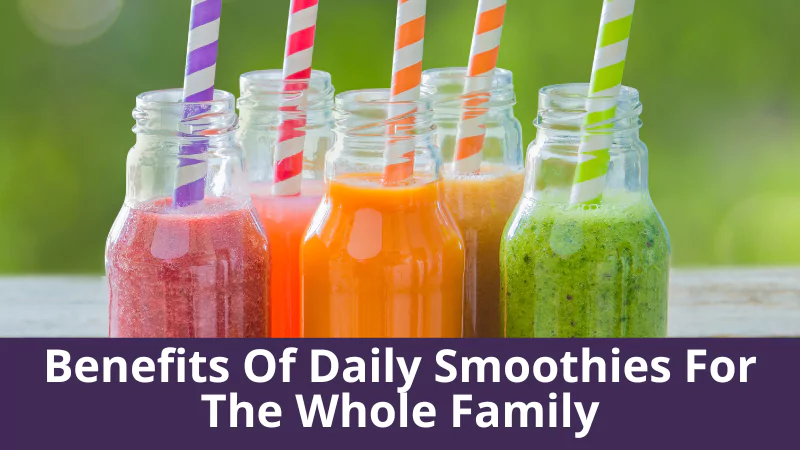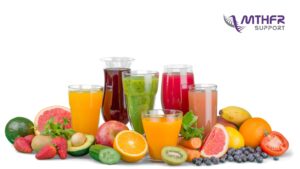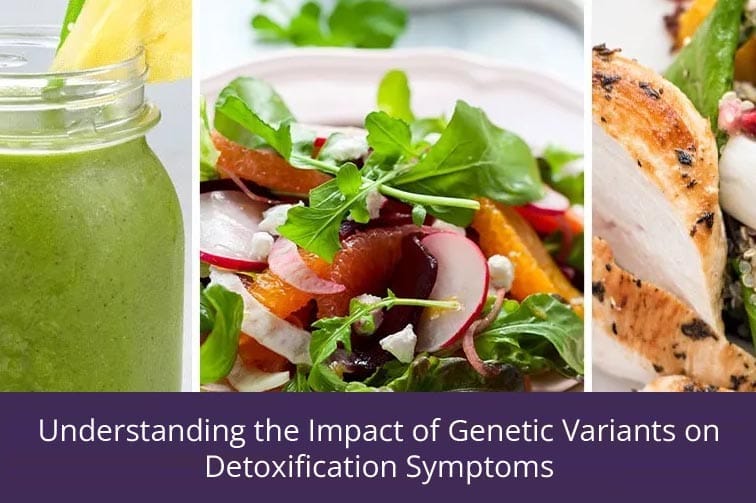Benefits Of Daily Smoothies. Ever heard of a breakfast smoothie? Many people drink them as an easy and convenient way to have breakfast on the go. But there are so many more benefits on offer.
Pack in More Fruits and Veggies
Did you know, according to Australia’s Health 2018 report, more than 99 percent of children and 96 percent of adults don’t eat the recommended intake of five serves of vegetables a day.
These vegetables we are missing out on, are packed full of the nutrients we need in our day-to-day life, such as potassium, dietary fibre, vitamin A, vitamin C and more. Dietary fibre alone helps to reduce blood cholesterol levels and lower the risk of heart disease. Instead, we are missing out on these key nutrients and are seeing a rise in obesity, which has been earmarked as a major concern in the report by Australian Institute of Health and Welfare.
It has been suggested that these poor eating habits start at an early age. A lot of children aren’t been introduced to a wide variety of vegetables for a number of reasons. They may refuse to touch them, so parents don’t persist. Parents may not eat them themselves, so they don’t push it on their children. It may not even have crossed the parent’s mind to get their children to try them.
It is very normal for kids to go through phases with their eating, and as stressful as it can be for you as a parent, the best thing you can do is ride the wave and keep encouraging them. There are so many reasons kids can turn off their foods, and it isn’t always an issue of taste. Just because they refuse a type of food one day, doesn’t mean they will the next. Their teeth could be hurting, they could be tired, or simply not into it that day.
Smoothies are a great way to ensure they are still getting those all-important fruits and veggies, even when they won’t eat them. After all, who doesn’t love a smoothie!
Support Healthy Immune System
Science has proven that with the right foods in our diet, we can boost our immune systems to fight off viruses, bacteria and other infections. Of course, trying to get all these foods into our diet can be a struggle at the best of times, which is why a smoothie is such a great alternative.
Smoothies are one of the easiest ways to up your vegetable intake and boost your immunity, but like other foods, it is important to mix it up. By changing the ingredients day to day and week to week, you are ensuring that you are still consuming a well-balanced diet, which is packed full of more nutrients than you would usually get.
Fruits and vegetables have been shown to offer a number of key nutrients, include beta-carotene, vitamin C and vitamin E, which all play a role in boosting your immune function. Being rich in antioxidants, they also reduce oxidative stress, which can occur when there is an imbalance of free radicals and antioxidants in the body.
Foods that boost your immune system include: citrus fruits, red peppers, broccoli, garlic, ginger, spinach, yoghurt, almonds, papaya and kiwi.
Restores Healthy Gut Bacteria
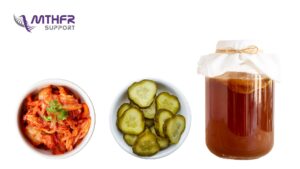 Probiotics are live bacteria or yeasts that are found in fermented foods and prebiotics are foods that feed your good bacteria. When you consume this bacteria, it resides in your gut and works to improve its overall health. As you can see, it’s important to consume probiotics in order to promote health gut function.
Probiotics are live bacteria or yeasts that are found in fermented foods and prebiotics are foods that feed your good bacteria. When you consume this bacteria, it resides in your gut and works to improve its overall health. As you can see, it’s important to consume probiotics in order to promote health gut function.
[thrive_text_block color=”light” headline=””]
Do you understand how Oxalates impact your patients’ health?
Do you have patients with hormone, joint and ligament issues?
This webinar gives you the knowledge to understand the causes, issues, and management of Oxalates.
[maxbutton id=”12″ url=”https://www.mthfrsupport.info/oxalateswebinar” text=”Purchase Your On-Demand Webinar ” window=”new” ]
[/thrive_text_block]
Why is gut health important? Your gut microbiota plays a number of different roles: it metabolises nutrients from food and certain medications you take, it serves as a protective barrier against intestinal infections, and it products vitamin K, which helps to create blood-clotting proteins. There are a number of differing factors that affect the function of our gut health, include age, diet, environment and medications. It has long been noted that antibiotics can actually deplete this gut bacteria.
The area you have most control over is your diet and a great way to ensure you are taking in enough probiotics is through smoothies.
Foods that restore healthy cut bacteria: fermented foods including kimchi, miso, kombucha and many pickles.
Boosts Energy
 When we run out the door in the morning, ready for the day, we want to start off with plenty of energy to see us through. This is one of the main benefits of drinking a smoothie in the morning.
When we run out the door in the morning, ready for the day, we want to start off with plenty of energy to see us through. This is one of the main benefits of drinking a smoothie in the morning.
While it’s true that all foods we consume provide us with some form of energy, it acts in different ways. Sugary drinks and fatty foods fuel the sugar into your blood nice and quickly, which leads to an inevitable crash that has you feeling tired and hungry again not long after. Did you know, that many of the cereals on the market are actually high in sugar, giving you this energy spike to start your day, before dropping off significantly later on.
If we eat the right foods, we can promote a slow release of energy that will see us through the day, without the need to reach for yet another coffee or sugary treat for that much-needed boost. Complex carbohydrates, healthy fats and protein are slower to digest, meaning they leave you feeling full for much longer, while also releasing a steady stream of energy at the same time.
Energy boosting foods include: bananas, apples, dark chocolate, goji berries, quinoa, oatmeal, yoghurt, hummus, edamame, lentils, avocado, oranges and strawberries.
Aids In Weight Loss
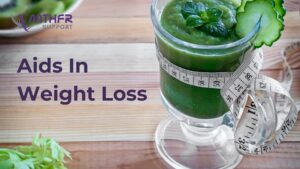 This is an added bonus that comes with smoothies, and is one that has been marketed by many businesses as a way to trim that fat. If done correctly, they really can. By stocking up on nutrients and adding them to your morning smoothie, it will help keep you feeling full for longer, to prevent you from mindlessly snacking throughout the day.
This is an added bonus that comes with smoothies, and is one that has been marketed by many businesses as a way to trim that fat. If done correctly, they really can. By stocking up on nutrients and adding them to your morning smoothie, it will help keep you feeling full for longer, to prevent you from mindlessly snacking throughout the day.
Research has found that when used as a meal replacement, particularly at breakfast time, smoothies are very beneficial for weight loss. Of course, this is under the assumption that you are putting the right foods into your smoothie to aid with this.
Foods that promote weight loss that you can include in your smoothie are: leafy greens, cottage cheese, avocados, apple cider vinegar, nuts, flaxseeds, fruit, chia seeds, coconut oil and yoghurt.
Base Recipe for Smoothie
 ¾ cup milk – you can substitute this for coconut milk, almond milk, lite milk, or any milk you like
¾ cup milk – you can substitute this for coconut milk, almond milk, lite milk, or any milk you like- ½ cup yoghurt – ideally a natural yoghurt, but you can substitute for coconut yoghurt.
- ½ a frozen banana – whether you are a big banana eater or not, this is what makes your smoothie nice, cold, thick and sweet! If you have a histamine issue then you can substitute with blueberries or raspberries, acai or blackberries
- B Vitamins – 1 scoop /Starter B, B12 or Total B (add link to our shop)
Blend this together using a blender, food processor or stick blender and serve.
This base smoothie offers fruit, protein, dairy and good fats. From here, you can add more ingredients to turn it into a nutritious meal substitute.
- ¼ cup traditional oats or bran: these are low GI carbohydrates that help to bulk out your smoothie and also work to keep you feeling full for longer.
- 2 teaspoons flaxseeds or LSA: full of omega 3 fats, which are essential nutrients in preventing and managing heart disease, as well as lowering blood pressure.
- 1 tablespoon peanut or other nut butter: this is a tasty addition to any smoothie, which can help you stay full for longer. This will aid in weight loss, discouraging you from snacking throughout the day.
- 2 teaspoons chia seeds: these are a true super food, loaded with fibre, omega 3 fats, antioxidants and high-quality protein. Eating 28g a day provides 18 percent of daily calcium needs, 27 percent of phosphorus and 30 percent of manganese. This reduces the risk of obesity, diabetes, heart disease and more.
- ¼ avocado: this provides more healthy fats to keep you full for longer. It can also add to the creamy texture of your smoothie. Avocados are a great source of vitamins C, E, K, and B-6, as well as riboflavin, niacin, folate, pantothenic acid, magnesium, and potassium. They also provide lutein, beta-carotene, and omega-3 fatty acids.
- Handful of baby spinach leaves or if you have a histamine issue, rocket, lettuce or kale: Spinach is rich in vitamins A, C and K, magnesium, iron and manganese. There are so many benefits that come from this leafy green, including reducing blood pressure and helping eye health. It’s a great green addition to a smoothie.
- Handful of grated carrot: Carrots are a great source of fibre, vitamin K, potassium and antioxidants. They are a great weight-loss food, with links to lower cholesterol levels and improved eye health. Carrots add a bit of sweetness to a smoothie, while also making its colour a tad more appealing to drink. Just watch the spinach and carrots if you have an oxalate issue. You might want to substitute rocket and zucchini instead.
- Frozen berries: fruit always makes a great addition to a smoothie, helping to hide some of those veggies added and provide a sweet touch. Remember, fruit does contain a fair amount of sugar, so be sure not to go overboard with this one.
Adding Powders To Smoothies
One of the key benefits of smoothies is the ability to add in some superfoods to give you a much-needed boost in essential vitamins. Here are some you can add to one of the recipes above to substitute a nutritious meal:
- Vitamin B12 powders: this is a powerful nutrient that keeps the body’s nerve and blood cells healthy. It also prevents a type anaemia – megaloblastic anaemia – that makes people tired and week. If you have gut issues, then Vitamin B12 may be low.
- Starter B powders: B vitamins offer a number of benefits to our bodies. They have a direct impact on your energy levels, brain function and cell metabolism. Having a dose of this Starter B provides
- Vitamin B1, 2, 3, 5 and 6, which allows you to add your own Vitamin B12 and folate. B Vitamins can help prevent infections, while also supporting cell health.
Multi B powders: our Multi B powders contain the activated forms of B vitamins, which your body can readily absorb and use. Other forms of B vitamins need to be converted into an active form before the body is able to use them.
Kickstart your day and your health with a powered smoothie that will have you feeling better, looking better and staying healthy for the long-term.
Resources:
- https://www.webmd.com/hypertension-high-blood-pressure/guide/omega-3-fish-oil-supplements-for-high-blood-pressure#:~:text=Omega%2D3%20fish%20oil%20contains,Lower%20blood%20pressure
- https://www.sbs.com.au/news/australians-don-t-eat-enough-vegetables-report-finds
- https://www.medicalnewstoday.com/articles/291334#benefits
- https://www.medicalnewstoday.com/articles/270406#:~:text=Avocados%20are%20a%20great%20source,and%20omega%2D3%20fatty%20acids.
- https://ods.od.nih.gov/factsheets/VitaminB12-Consumer/
- https://www.pritikin.com/are-smoothies-healthy-weight-loss
[thrive_text_block color=”light” headline=””]
Do you understand how Oxalates impact your patients’ health?
Do you have patients with hormone, joint and ligament issues?
This webinar gives you the knowledge to understand the causes, issues, and management of Oxalates.
[maxbutton id=”12″ url=”https://www.mthfrsupport.info/oxalateswebinar” text=”Purchase Your On-Demand Webinar ” window=”new” ]
[/thrive_text_block]

